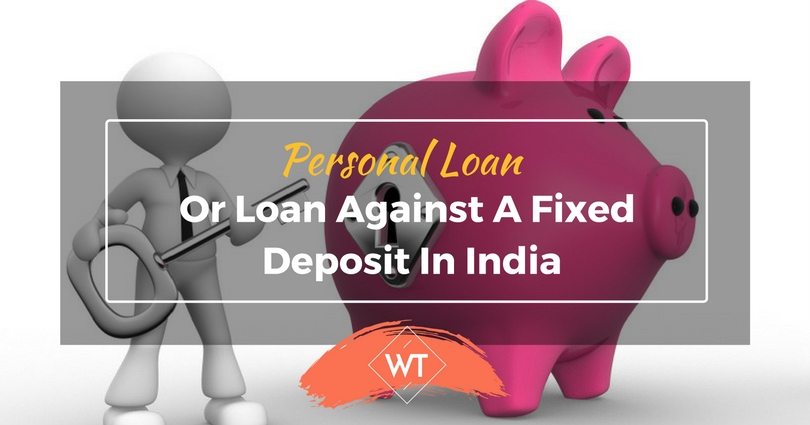Personal Loans or Loan Against a Fixed Deposit in India

Personal loans can come in for rescue when you require quick funds. Personal loans as the name suggests can be for any purpose unlike auto, home or education loans that are tied to a specific purpose. Processing personal loans is simpler; but there is an alternative to take a personal loan that should definitely be explored; this is loan against fixed deposits.
Loan against fixed deposits
Fixed deposits (FD) are still the most popular investment choice. Getting a loan against bank deposits is simpler and faster as the person already has a relationship with the bank. All the documents are provided when opening a savings or deposit account. This makes the processing of a loan quick.
In case you need a loan against the FD or FDs, you need to approach the bank with your FD (in case no printed FD is provided by the bank, the bank will print one before processing the loan). However do remember that loan can be sanctioned against only stand alone deposits and not against flexi-deposits that are linked to the savings account.
Depending on the policy and guidelines of the bank the rate of loan is 2-3 percent higher than that of the deposits. For a deposit that is at 8.5% interest you can get a personal loan at 10.5% to 11.5%. The amount of loan that is sanctioned will be dependent on the amount of your deposit and the bank policies. Banks sanction loans equivalent to 80-90% of the deposit value. This may vary from bank to bank and sometimes the branch manager’s discretion.
NBFCs also provide loans against deposits and loan can also be taken against tax saver FDs. The deposit will have to be pledged to the bank and will have to be handed over to them.
Personal loans vs Loan against fixed deposits
Typically loan against deposits and personal loans are taken to fulfill miscellaneous financial obligations for which no separate category like auto, home, and education exists. It can be for a wedding, sudden illness or even a trip abroad. Both are for generally a short term ranging from 1 (or maybe lesser) to 5 years.
Processing Fee: Before sanctioning a personal loan the bank/financial institution will be required to do their due diligence, process documents, make checks etc. Thus they will charge a processing fees; bank already has everything with it so no charges are required.
Interest Rates: The highest rate of FD in current scenario is 9.5 to 10%. So the rate of interest for loan against deposit can be a maximum 13% (the upper limit; usually it will be between 11.5 to 12%). The personal interests can vary from 13% to 18% generally and sometimes go beyond 20% also.
Amount of Loan: The amount of personal loan sanctioned will depend on you other liabilities, your monthly income and the credit score. When taking a loan against FD it will be less than your deposit amount; for a deposit of 200,000 you can get a maximum of 160,000 only as loan (in case the bank sanction 80% of the deposit value as loan).
So in case you require a bigger amount then personal loans seem to be the option for you. In case you have 6-7 deposits of smaller amounts spread against branches/banks taking a loan against all of them can be complicated and time consuming.
Repayment Terms: For a personal loan the repayment is always through EMIs, unlike loan against deposits where it may be EMIs, lump sum at the end of the tenure or as decided mutually between the bank and the customer. Duration of a personal loan will be fixed and there is a pre-payment penalty. For a loan against FD the term is the duration of the FD; if it is to be extended beyond that then the FD needs to renewed and the terms like interest rate are renegotiated.
Despite the edge loan against FDs have over personal loans; personal loans have a few benefits too. The choice is wider you are not restricted to the bank that you have a FD in. Amount of loan is also not restricted and they are available for a longer time.
So next time you need some funds make sure you look at your deposits before applying for a personal loan.









Leave a Reply